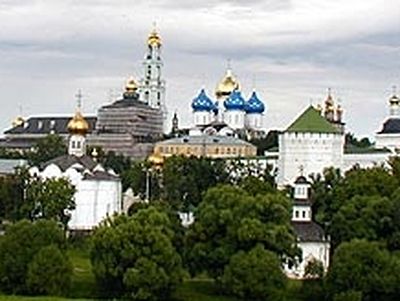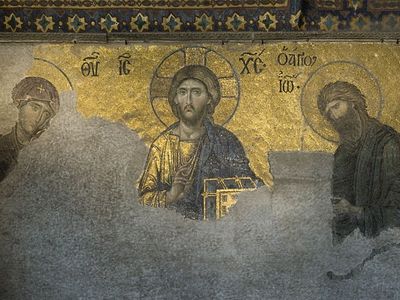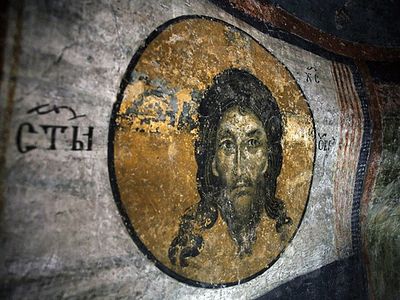Source: The Palamas Institute
Sunday, August 9, 2015: Tenth Sunday after Pentecost & Tenth Sunday of Matthew, After-feast of the Transfiguration of Christ
Apostle Matthias; translation of the relics of Venerable Herman of Alaska, wonderworker of America
EPISTLE: 1 Corinthians 4:9-16
GOSPEL: Matthew 17:14-23
Though often misunderstood, paternity is a central, actually essential, concept to the right understanding of the Christian tradition.
Strictly speaking the only Father is God the father of our Lord Jesus Christ. Other fathers—biological or spiritual—are fathers only by analogy. Human fathers are only fathers to the degree that they reflect faithfully the paternity of God.
For classical Christian orthodoxy, to call God Father isn’t to make a statement about sex but relationship. God the Father is (as we hear in the service of the Church), the Unoriginate Source. This doesn’t mean that God exists in isolation from either of the other two Person of the Holy Trinity. The Son is the Son because He is begotten by the Father. Likewise the Holy Spirit is the Holy Spirit because He is breathed forth from the Father. And none of this implies moral or social or ontological necessity; there isn’t something or someone “behind” God compelling Him to generate the Son or breathe forth the Spirit.
Something similar happens with creation.
There is nothing external to God requiring Him to create. What He does, He does simply from love. God loves us not because of who we are but because of Who He is and it is His love that makes us who we are.
Paternity then in the tradition is not about power or authority as the world understands them. To be a father is to love in such a way that the beloved becomes more fully who he or she is. How does this happen? How do I, like Paul, love people in such a way that they become more themselves? There an interesting notion in Hasidic spirituality that can help here.
Tzimtzum or self-contraction is the idea that God creates not by imposing the His will on what isn’t God. Rather God creates by drawing back, making Himself “smaller.” In other words, God creates by making room for whatever isn’t God. God makes room for us; He allows us the space and freedom we need to find Him and so find ourselves.
The Christian counterpart to this is kenosis, the self-emptying of the Son that culminates in the Cross (Philippians 2). The Apostle Paul is faithful to this self-emptying example of Christ. And it is because he is faithful that—like other apostles—he is like a man “sentenced to death; … a spectacle to the world, to angels and men.” The Apostle’s fidelity to not only the teaching of Christ but to the example of His Person means that Paul is a fool, and a man held in disrepute by the powerful of this world.
Paul’s fidelity is also the source of his great moral and spiritual strength. It is why he can bear all things not only for the sake of Christ but for the salvation of the Corinthians. His willing self-emptying, his tzimtzum, is what that makes Paul more than simply a guide or a teacher. His kenosis makes him a spiritual father for the Corinthians, the Gentile world and each of us.
Turning to the Gospel reading, it is absence of this self-emptying faith that makes the disciples powerless over the demons. As of yet they haven’t come to accept for themselves what Christ has accepted for Himself. “The Son of man is to be delivered into the hands of men, and they will kill Him, and He will rise on the third day.”
Just as God the Father doesn’t impose His will on His Son, He doesn’t impose Himself on us. Instead God woos us. God creates us in love and then, to speak in human terms, He falls in love with us over and over and over again. In the Song of Solomon the bride says of her beloved that “he comes leaping over mountains, bounding over the hills” (Song 2:8). Commenting on this St Gregory of Nyssa says Christ has “made every rebellious power subject to Himself, both the inferiors powers [i.e, ‘hills’] and those that are greater [i.e., ‘mountains’]” all “are trampled and destroyed by the same power and authority” of God’s love for us (“Homilies on the Song of Songs,” 5 in ACCS, OT vol IX, p. 138).
Origen says that if we want to see Christ leap, “we must first hear His voice” (“Commentary on the Song of Songs,” 3.11, in ACCS, OT vol IX, p. 138). To hear the voice of God means to give ourselves over to stillness and prayer. It is in this way that we can come to love the God Who loves us. It is through stillness and prayer that I respond to the God Who calls me by name (Isaiah 43:1) and who has loved me from my mother’s womb (Jeremiah 1:5). Especially at first, I might be hesitant to open myself up in this way to God. This is understandable. But I need to remember that God doesn’t impose Himself on us. At creation, in the incarnation and above all on the Cross, God empties Himself, He makes Himself small so that there is room for us to grow, to develop, to blossom and to become the persons who from all eternity He created us to be.
Spiritually as well as biologically, a man can’t become a father without a woman who is willing to become a mother. Spiritual fatherhood is only possible under the guidance and example of the Most Theotokos and Ever-Virgin Mary. She is the Mother of the Church and the Mother of priests. It is to her that bishops and priests as well as biological fathers must look to fulfill their obligations. It is only in being faithful to the example of Mary ‘s maternity that they can be faithful to God’s paternity.
Whatever the failures or successes of our earthly fathers—biological or spiritual—we have a Father in Heaven Who waits patiently and in love to receive us, ever eager to reveal His love and affection for us, to forgive us our sin and to heal us from all that binds us. To borrow from St Herman of Alaska whose memory we celebrate today, “let us make a vow to ourselves, that from this day, from this hour, from this very moment, we shall strive above all else to love God and to fulfill His Holy Will!”
In Christ,
+Fr Gregory





